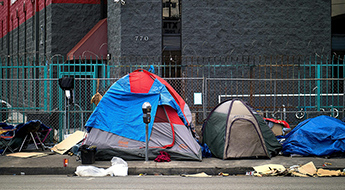In Survey, Two-Thirds of Parents Voice Concern About Students’ Learning Losses
But a majority also comes out against a return to physical classrooms
Get all our news
[T]here is a Catch-22 given substantial concerns about learning loss but also opposition to returning to in-person. It is an unfortunate stress that many parents are living with—believing their children are learning less but that it is not safe to return to school.”
James Druckman
IPR political scientist

Two-thirds of respondents (67%), whether students or parents, say they are concerned about the quality of K–12 learning during the pandemic, according to a new national survey of more than 25,000 people by Northwestern, Northeastern, Rutgers, and Harvard universities. The finding holds across respondents from different racial backgrounds, incomes, and political affiliations.
“The shift to virtual learning was impressive in many ways, but after nearly a year, it is clear that concerns are growing,” said IPR political scientist James Druckman.
He is one of the researchers involved with the university research consortium investigating attitudes on COVID-19.
School districts, teachers, parents, and students around the nation have struggled with how to handle schooling since March when the pandemic struck. These struggles are seen in negotiations over returns to in-person learning such as those currently being discussed between Chicago Public Schools, the nation’s third largest school district, and the Chicago Teachers Union.
Conducted between December 16 and January 11, the study shows that slight majorities of parents had concerns about learning losses for their children when compared to school prior to the pandemic. Concerns were highest among parents of middle schoolers (55%), followed by those of high schoolers (52%), and then kindergarten and elementary students (49%). But majorities also came out against a return to in-person learning.
Parents Weigh in on Students’ Learning Losses … and Gains
Interestingly, at least 1 parent in 10 reported their school-aged children had actually learned more during pandemic schooling: 13% for elementary school students, 11% for middle schoolers, and 10% for high schoolers.
The researchers also see some evidence for differences in parents’ perceptions of their children’s learning, according to how much they earn and what grades their children are in.
For elementary school children, most parents earning $75,000 or less per year (52–54%) believe their children were learning less versus those in higher-income brackets. On the other side of the question, between 19% and 23% of parents who earn $150,000 or more per year were more likely to say that their primary school aged children were learning more, compared with 10–11% of parents earning $75,000 or less.
For older students, the findings on learning losses flip. More than half of the wealthiest parents, or those earning $200,000 or more per year, are most likely to believe their high school and middle school children are learning less during the pandemic, or 61% and 54% respectively. Still, 23% of parents making between $150,000 and $200,000 say their children are learning more, as do 13% of those making more than $200,000. But for those parents in the lowest income bracket, or making $25,000 or less, only 7% of them believe their children are learning more.
More than Half of Parents Nationwide Are Against a Return to In-Person Learning
As to whether parents support a return to in-person learning in schools, majorities in 46 of 50 states came out against a return to in-person learning. In Illinois, the figure stood at 74% of parents against returning to in-person classes.
 The researchers find two-thirds or more respondents in a majority of states declared they do not want to see a return to in-school learning. But they also find a clear partisan divide in the states and the District of Columbia: Those in which most are against a return to school were solidly Democratic (New York, Massachusetts, California, Maryland, Hawaii, and D.C.), while the eight states where the majority stands behind a return are all strongly Republican (Wyoming, North Dakota, South Dakota, Montana, Utah, Idaho, Nebraska, and Kansas).
The researchers find two-thirds or more respondents in a majority of states declared they do not want to see a return to in-school learning. But they also find a clear partisan divide in the states and the District of Columbia: Those in which most are against a return to school were solidly Democratic (New York, Massachusetts, California, Maryland, Hawaii, and D.C.), while the eight states where the majority stands behind a return are all strongly Republican (Wyoming, North Dakota, South Dakota, Montana, Utah, Idaho, Nebraska, and Kansas).
“The partisan trends echo the patterns we have seen for most COVID-19 related policies. Here, though, there is a Catch-22 given substantial concerns about learning loss but also opposition to returning to in-person,” Druckman said. “It is an unfortunate stress that many parents are living with—believing their children are learning less but that it is not safe to return to school.”
Smaller Majority Favors Requiring Students Vaccinate to Return to School
 Although clinical trials of vaccines for children under 16 are yet to be completed, 56% of parents with children at home approve that children should be required to receive a COVID-19 vaccine before going back to school. Support for a vaccine requirement increases with income level.
Although clinical trials of vaccines for children under 16 are yet to be completed, 56% of parents with children at home approve that children should be required to receive a COVID-19 vaccine before going back to school. Support for a vaccine requirement increases with income level.
The survey also reveals large partisan gaps in requiring vaccination. Republicans are much less supportive of mandating a vaccine to return to school (41%) than Democrats (71%) and Independents (53%). In terms of race and ethnicity, 54% of White respondents are less supportive of a vaccine requirement than other racial and ethnic groups, and support for the requirement was highest among Asian Americans at 68%.
Majorities in 35 states, plus Washington, D.C., support a mandatory vaccine for children to return to school. The 15 states with the least support for vaccines all lean Republican, and almost all experienced a surge in the pandemic in the summer or fall.
Read the complete report here.
James Druckman is the Payson S. Wild Professor of Political Science and IPR Associate Director. Previous surveys can be found here.
Photo credit: A. Piacquadio, Pexels
Funding for the reports came from the National Science, Knight, and the Russell Sage foundations. Data collection was partially supported by Amazon. Any opinions, findings, and conclusions or recommendations expressed in the studies are those of the authors and do not reflect the funders’ views.
Published: February 9, 2021.


